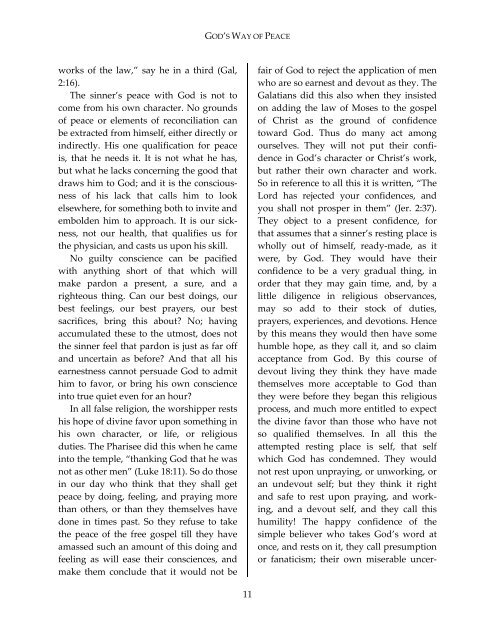God's Way of Peace by Horatius Bonar, D.D.
The seasoned Scottish pastor wrote this short devotional for those suffering from guilt, anxiety, or the consequences of sin. He writes with neither chastisement nor condemnation, but rather immediately directs his readers to Christ’s gift of salvation through his death and resurrection. Bonar reminds all that the Gospel offers hope for the sinner and comfort for the troubled, for God’s perfect, constant grace never fails those who accept it. From Bonar’s time to the present, people have found peace with God afresh through this book. Many people report having read it several times, and turning to it again and again when troubles arise. Kathleen O’Bannon CCEL Staff
The seasoned Scottish pastor wrote this short devotional for those suffering from guilt, anxiety, or the consequences of sin. He writes with neither chastisement nor condemnation, but rather immediately directs his readers to Christ’s gift of salvation through his death and resurrection. Bonar reminds all that the Gospel offers hope for the sinner and comfort for the troubled, for God’s perfect, constant grace never fails those who accept it. From Bonar’s time to the present, people have found peace with God afresh through this book. Many people report having read it several times, and turning to it again and again when troubles arise.
Kathleen O’Bannon
CCEL Staff
Create successful ePaper yourself
Turn your PDF publications into a flip-book with our unique Google optimized e-Paper software.
GOD’S WAY OF PEACE<br />
works <strong>of</strong> the law,” say he in a third (Gal,<br />
2:16).<br />
The sinner’s peace with God is not to<br />
come from his own character. No grounds<br />
<strong>of</strong> peace or elements <strong>of</strong> reconciliation can<br />
be extracted from himself, either directly or<br />
indirectly. His one qualification for peace<br />
is, that he needs it. It is not what he has,<br />
but what he lacks concerning the good that<br />
draws him to God; and it is the consciousness<br />
<strong>of</strong> his lack that calls him to look<br />
elsewhere, for something both to invite and<br />
embolden him to approach. It is our sickness,<br />
not our health, that qualifies us for<br />
the physician, and casts us upon his skill.<br />
No guilty conscience can be pacified<br />
with anything short <strong>of</strong> that which will<br />
make pardon a present, a sure, and a<br />
righteous thing. Can our best doings, our<br />
best feelings, our best prayers, our best<br />
sacrifices, bring this about? No; having<br />
accumulated these to the utmost, does not<br />
the sinner feel that pardon is just as far <strong>of</strong>f<br />
and uncertain as before? And that all his<br />
earnestness cannot persuade God to admit<br />
him to favor, or bring his own conscience<br />
into true quiet even for an hour?<br />
In all false religion, the worshipper rests<br />
his hope <strong>of</strong> divine favor upon something in<br />
his own character, or life, or religious<br />
duties. The Pharisee did this when he came<br />
into the temple, “thanking God that he was<br />
not as other men” (Luke 18:11). So do those<br />
in our day who think that they shall get<br />
peace <strong>by</strong> doing, feeling, and praying more<br />
than others, or than they themselves have<br />
done in times past. So they refuse to take<br />
the peace <strong>of</strong> the free gospel till they have<br />
amassed such an amount <strong>of</strong> this doing and<br />
feeling as will ease their consciences, and<br />
make them conclude that it would not be<br />
fair <strong>of</strong> God to reject the application <strong>of</strong> men<br />
who are so earnest and devout as they. The<br />
Galatians did this also when they insisted<br />
on adding the law <strong>of</strong> Moses to the gospel<br />
<strong>of</strong> Christ as the ground <strong>of</strong> confidence<br />
toward God. Thus do many act among<br />
ourselves. They will not put their confidence<br />
in God’s character or Christ’s work,<br />
but rather their own character and work.<br />
So in reference to all this it is written, “The<br />
Lord has rejected your confidences, and<br />
you shall not prosper in them” (Jer. 2:37).<br />
They object to a present confidence, for<br />
that assumes that a sinner’s resting place is<br />
wholly out <strong>of</strong> himself, ready‐made, as it<br />
were, <strong>by</strong> God. They would have their<br />
confidence to be a very gradual thing, in<br />
order that they may gain time, and, <strong>by</strong> a<br />
little diligence in religious observances,<br />
may so add to their stock <strong>of</strong> duties,<br />
prayers, experiences, and devotions. Hence<br />
<strong>by</strong> this means they would then have some<br />
humble hope, as they call it, and so claim<br />
acceptance from God. By this course <strong>of</strong><br />
devout living they think they have made<br />
themselves more acceptable to God than<br />
they were before they began this religious<br />
process, and much more entitled to expect<br />
the divine favor than those who have not<br />
so qualified themselves. In all this the<br />
attempted resting place is self, that self<br />
which God has condemned. They would<br />
not rest upon unpraying, or unworking, or<br />
an undevout self; but they think it right<br />
and safe to rest upon praying, and working,<br />
and a devout self, and they call this<br />
humility! The happy confidence <strong>of</strong> the<br />
simple believer who takes God’s word at<br />
once, and rests on it, they call presumption<br />
or fanaticism; their own miserable uncer‐<br />
11

















